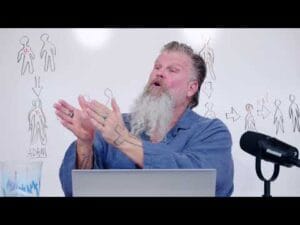
Genesis 41:29-57 Bible Teaching
Joseph interpreted Pharaoh's dreams, predicting seven years of abundance followed by famine, advised storing surplus food, and was appointed to oversee the plan.

Joseph interpreted Pharaoh's dreams, predicting seven years of abundance followed by famine, advised storing surplus food, and was appointed to oversee the plan.

Joseph interprets dreams in prison, predicting outcomes for Pharaoh's butler and baker. Despite his accuracy, the butler forgets him. Emphasizes God's role in true interpretation.

Shawn's teaching covers Genesis 39, Judah and Tamar's story, Joseph's rise in Egypt, integrity, divine favor, and resisting temptation through gratitude and love.

Shawn challenges the Trinity, emphasizing faith and love as core to understanding God. He proposes "Plurality of One," viewing God as a dual entity, not a trinity, with Elohim as a unified plural form. This teaching highlights unity in duality, reflecting God's nature as singular yet plural, advocating a shift from traditional creeds.

Shawn challenges traditional beliefs on YHWH's pronunciation, critiques Masoretic Text's authenticity, and promotes "YAHAVA" as God's true name, emphasizing love and life.

Shawn's teaching highlights the Old Testament's role in understanding Christ, refutes modern moral decay views, emphasizes hope, and the Holy Spirit as a pledge of redemption.

The teaching emphasizes the role of women in biblical genealogies, focusing on Tamar, Rahab, Ruth, and Bathsheba, highlighting themes of redemption, inclusion, and marriage's significance in God's plan. It also explores God's relationship with Israel as a marriage, addressing themes of faithfulness and spiritual adultery, culminating in a new covenant through Jesus.

Teaching on Genesis 38 highlights Judah's moral challenges, deception, and familial duties. It discusses Onan's misunderstood sin, masturbation's biblical view, and spiritual liberty.

Joseph's story in Genesis 37-50 highlights familial favoritism, sibling rivalry, and divine mission parallels with Jesus. Dreams as divine communication require scriptural alignment.

Jacob's journey to Bethel, name change to Israel, Rachel's death, spiritual rebirth, Esau's lineage, Joseph's betrayal, and prophetic dreams are key themes.

Shechem's genuine feelings for Dinah conflict with cultural norms; Jacob's sons use deceit and violence, highlighting tensions in intermarriage and identity. Shawn emphasizes biblical caution against foreign marriages, using circumcision deceitfully for revenge. Jacob's fear and self-centeredness contrast with God's directive for spiritual renewal. A parable illustrates God's invitation to all, requiring faith and readiness. A nation's divine protection is remembered as a testament to God's goodness.

Shawn's teaching examines Genesis 32-34, focusing on Jacob's spiritual journey, the significance of Peniel, the ethical implications of gid ha-nasheh, Jacob's reconciliation with Esau, and the cultural context of Dinah's story, highlighting ancient norms and interpretations.

Shawn's teaching highlights Jacob's transformation to Israel, symbolizing spiritual struggle, human potential, and inward faith over outward power, emphasizing spiritual renewal.

Jacob's fear of Esau leads him to divide possessions and seek God's protection. He exemplifies humility, faith, and strategic reconciliation, paralleling Jesus' submission. His wrestling at Peniel symbolizes spiritual struggle and transformation, emphasizing reliance on divine intervention and genuine desire to know God.

The teaching focuses on spiritual guidance in interpreting Scripture, resolving conflicts, and making amends. It highlights Jacob and Laban's story, emphasizing fear, reconciliation, divine intervention, and covenant-making with a stone heap as a witness. Themes include familial bonds, deception, and divine oversight, with Jacob's reliance on God despite adversities.

Rachel prays for a child, births Joseph. Jacob negotiates with Laban for speckled livestock, gains wealth. Divine guidance aids Jacob amid Laban's deceit. Rachel steals idols.

Jacob was tricked into marrying Leah before Rachel, whom he loved more. Leah bore key sons despite being less loved. The story highlights cultural customs, divine intervention, and the significance of lineage. Rachel and Leah's rivalry, reliance on mandrakes, and God's ultimate authority over life are central themes.

Shawn's teaching highlights Jacob's transformative experience at Bethel, emphasizing God's presence, anointing, and unconditional love. It contrasts transactional vows with selfless devotion, using biblical examples like Jacob's vow and Jesus' teachings. Jacob's journey, cultural practices, and familial duties are explored, including his service for Rachel and Laban's deception, reflecting themes of love, duty, and retribution.

Shawn's teaching highlights the harm of revenge, advocates for forgiveness, and emphasizes faith in Jesus as the connection to God, offering salvation and eternal life.

Shawn's teaching explores Jacob and Esau's story, highlighting human choice, deceit, and divine purpose. It emphasizes spiritual over worldly values, faith, and God's plan.